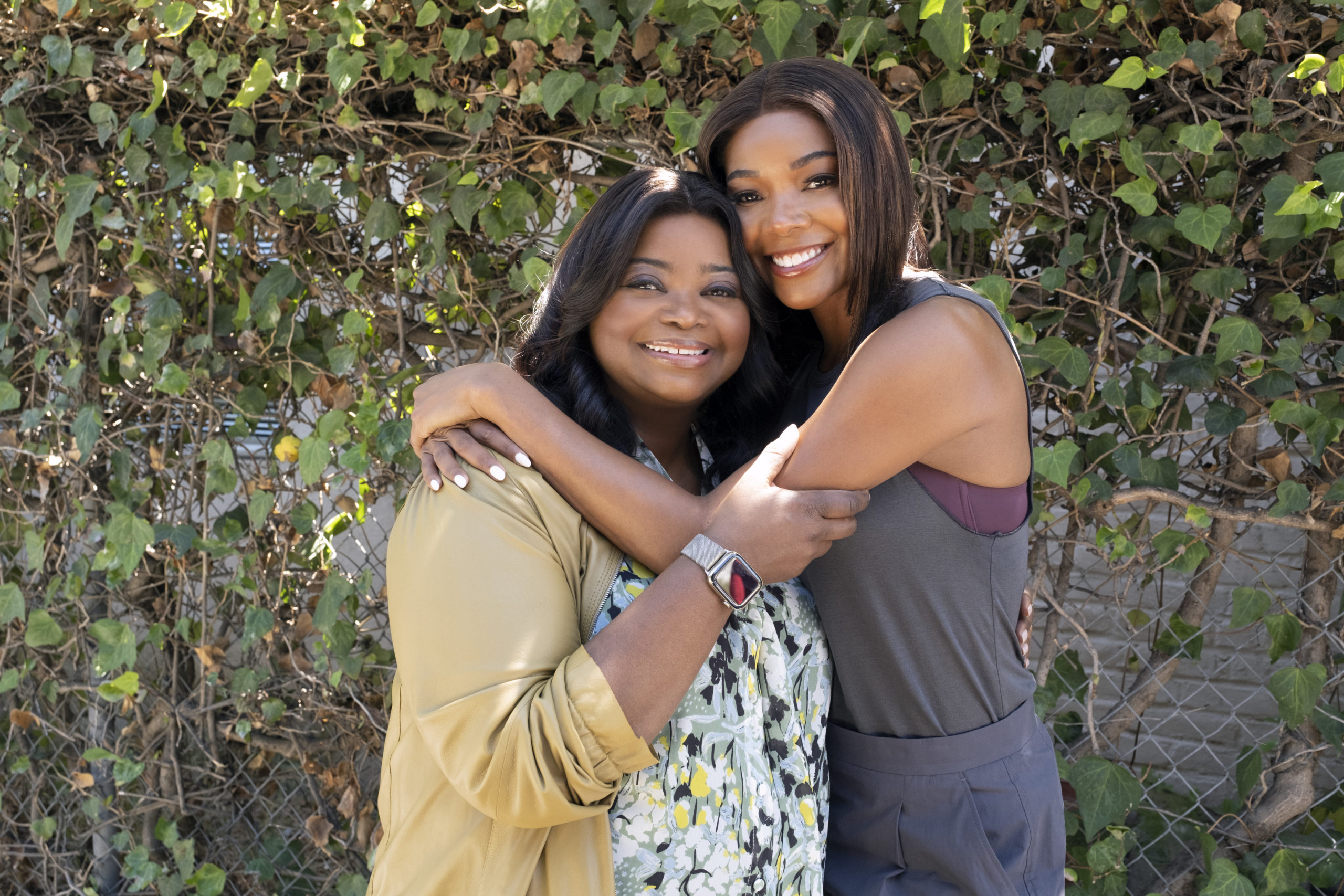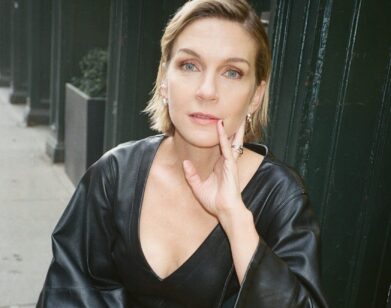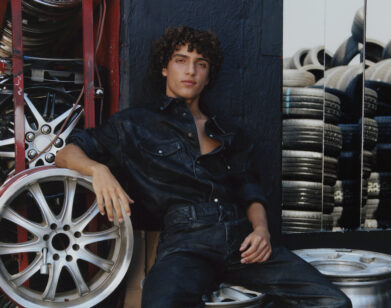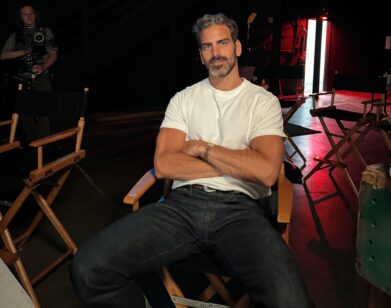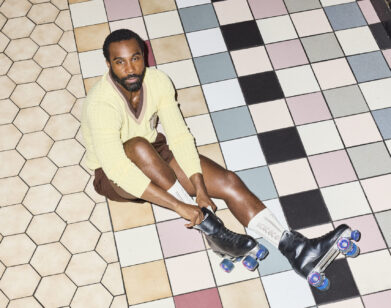IN CONVERSATION
Gabrielle Union and Octavia Spencer Are Making Black and Brown Girls the Priority
Two decades after first working together in the early 2000s series City of Angels and 2004’s rom-com Breakin’ All The Rules, Gabrielle Union and Octavia Spencer are finally reuniting on screen. Having claimed an Oscar for her work in The Help, Spencer continues to make space for Black stories about womanhood in the third season of Apple TV+’s anthology series Truth Be Told. Union plays Eva, a high school principal fighting to bring attention to several missing Black girls in her community and, with the help of Spencer’s crime-obsessed Poppy, the two unravel a sex trafficking and abuse ring. “Over and over again it becomes crystal clear that Black and brown girls are never the priority,” Union told Spencer. “Our safety, our innocence, and our peace is never the priority.” Below, the Truth be Told co-stars have a disarmingly candid conversation about on-set etiquette, processing trauma on screen, and how they unwind after filming such heavy projects.
———
SPENCER: It’s good to see you, my Christmas tree is still up, and I’m getting a lot of flack about it? Can I just ask you, is your tree still up?
UNION: No, that tree comes down whatever the first Monday is after New Year’s.
SPENCER: I’m going to try. I’m trying to keep mine up for an extended period. There’s nothing more beautiful than the Christmas spirit.
UNION: Now, is your tree artificial or—
SPENCER: It is quite artificial. It’ll be very dry.
UNION: Leave it up all year long. I don’t like an old tree.
SPENCER: No, I understand that, because my wreath was still up and it was at death’s door when I took it down. I’m going to have to get better about taking that tree down.
UNION: But not today. You better live in that spirit. See how I plugged your other movie there [Spirited].
SPENCER: Speaking of movies, you’ve had a wonderful award season thus far because of some great choices that you’ve been making as an actress. How are you choosing projects, Gabrielle?
UNION: Well, at the moment, things that terrify me. And The Inspection terrified me because it was going to require something I’m just not used to doing, which is the work. When you have to do the work, you end up working on yourself. Maybe that just naturally led me to Truth be Told. The material obviously scared me, because just like The Inspection, I live it. I have lived it. But, as our friend Sanaa Lathan said, “Baby, if it doesn’t scare you, it’s not worth doing.”
SPENCER: This is true.
UNION: And so I’ve been trying to scare the hell out of myself.
SPENCER: Perpetually scared!
UNION: [Laughs] Yes, terrified.
SPENCER: Well, your work this season is just stellar, and I think we work so well together because we approach the work the same way. Our work ethic is to show up ready to hit the ground running. For me, the discovery process, which is while we’re on set, is so interesting, because in television there’s so little time for rehearsal. You find things when you’re shooting the scene. You’re such a strong person that I remember one day our characters were having an argument in the whisper room. I looked up and I saw this huge moment of vulnerability and I got really worried. You know what I mean?
UNION: I don’t show it, ever.
SPENCER: You don’t. You are one of those people. And when you did, it was in the scene, and then immediately after I was like, “Oh my God, I have to check on her.” You come in, you command a room, you command the work. And it’s one of the things that I respected about you. Did you find yourself, because of the subject matter, feeling vulnerable a lot?
UNION: Yeah, and trying to cover it a lot. Because in doing this work and talking about sexual violence, talking about sexual assault for 30 years, 25 of those publicly speaking about it, what ends up happening is I have to make other people comfortable with my trauma. I don’t know, it’s just another job. The job of how do you make such difficult subject matter palatable for other people? But it’s always been nonfiction, if you will. It’s just been firsthand accounts. In this sense, I’m talking about it through the work, but I still feel that responsibility to make people feel okay. You know what I mean?
SPENCER: I do.
UNION: After they yell, “cut,” and to try to cover, because my trauma is messy, complicated, and ugly. I’m so protective of other people having to see it. Trauma is hard to process for a lot of people, and certainly in real time. I prioritize the reception.
SPENCER: Definitely. The beauty of all of that came out in your performance. When you saw the script for Truth Be Told, what made you say, “Yeah.” I remember I texted you.
UNION: First and foremost, we haven’t had a chance to work together in… I mean how many years, over 20?
SPENCER: Over 20.
UNION: And I love you.
SPENCER: And I love you.
UNION: I love how you are on set. I love how you are in life. I was a fan of the show. I only wanted to do comedies in 2022, and my team was like, “I know you said comedies, but I think you might rethink that, once you read the script and know that it’s your friend and blah blah blah.” When I realized what the subject matter was, I felt like I was really the only person truly qualified to not only know what needs to happen on set, but [to do the part] in times like these right now, where we can actually talk about it and really expand the conversation. I was jumping at the chance, and that scared me.
SPENCER: Yes, I understand that. What I love about this show is the investigative end. Because in my own life, you know me, I have to solve a mystery a day. This season, because it’s socially relevant with the missing girls, it just struck a personal chord, and it terrified me in a way that felt singular. Being a woman, the thought of ever going missing, would someone look for me? The same thing for my nieces and nephews. The difference and the disparity in what happens when people of color go missing. I think the thought of it was exciting, and then we started doing it, it definitely got scary. Taking this journey with you has been one of those things that we don’t get to do often. Because it will make a difference in a lot of people’s lives. Instead of just being about entertainment, it’s socially relevant. We are, I hope, this season will broaden this conversation and allow parents to talk to their kids about who they’re talking to online, how they are conducting themselves in the world, and to be more watchful and be their brother’s keeper.
UNION: Oh yeah, absolutely. It’s like you look at social media, you look at the news, you look at just our regular community conversations, and you realize, over and over and over again it becomes crystal clear that black and brown girls are never the priority. Our safety, our innocence, and our peace is never the priority. If you have the opportunity and you have the bully pulpit, which is a large social media platform, or the ability to actually create art that addresses these huge societal challenges, and you don’t, that I think is what makes you a bad person.
SPENCER: I agree.
UNION: I don’t think neither one of us are bad people.
SPENCER: No.
UNION: In doing Truth Be Told, at a pretty high personal cost, the reward of enlightening people that the danger is not in some far away place.
SPENCER: It’s true.
UNION: It’s a lot closer than you think.
SPENCER: Wow. I think that without ever articulating that in my thoughts, hearing it out loud, that was always in the back of my thoughts. Danger isn’t far away. It’s very immediate at all times. That’s something that we don’t really think about.
UNION: Some people think you can price your way out of danger, that you can educate your way out of danger, that you can speak the Queen’s English out of danger, and the reality is, just like everyone else that exists on this planet that doesn’t have the same means and experience as the privileged few, to understand the immediacy of danger is jarring. I think we bring that into crystal clear focus.
SPENCER: Yes, we do. I know I’ve said it via text and social media, but I really am excited that we got to have this season together. You actually grounded it in a reality. Any other actress would not have a life experience that supports this very necessary conversation.
UNION: Thank you.
SPENCER: Thank you for playing with us in the sandbox and bringing some gravitas to a very, very, very important story.
UNION: It is necessary to tell these stories. Personally, I realized, certainly towards the end, that I had not healed from my own trauma. In July, it was the 30-year anniversary of my sexual assault. And for five months of us filming, it was just one long trigger. Again, when you’re talking about people who have experienced extreme trauma, like young women and girls who have been trafficked, we minimize the damage and how long it should take you to bounce back and recover. We don’t understand that a lot of what these folks are experiencing will last lifetime. They get a lifetime sentence. I have gotten lifetime sentence. I don’t know if luckily is the right terminology, but my brain didn’t allow me to fully tell the story. Throughout us filming, slowly over the five months, it pulled back the veil that had existed for 30 years. I got the full picture and it was devastating. I realized that as a teenager experiencing this, if I had known all of it consciously, presently, I wouldn’t be here. When you think about what these girls, children, babies, and folks are experiencing daily—that happened to me once. This happens daily for these children. There’s an urgency to tell these stories and the urgency to get people the help that they need and the resources that they need for the rest of their lives.
SPENCER: Quite honestly, I believe this is our best season yet because we are dealing with something real and we have a chance to help real people, even though our story is fiction. We have a chance to help real people in real time. And it was fun working with you even though it wasn’t a fun subject.
UNION: I mean, we had to find the levity. I mean, I couldn’t really find it as much until toward the end, when I could see the light at the end of the tunnel. But normally, how do you unwind after?
SPENCER: It’s a process. I take lots of baths, which is why my skin is so dry. I’ve got to stop having my old friend Mr. Wine. But I do wine down. Glass of wine, a hot salty bath, just to keep it kind of even-keeled for me, I don’t completely tap out of it until I’m done with the season. One of the things I do is definitely watch a mystery each night, but it’s odd, I don’t like anything dealing with rape and anything like that. I only deal with murder mysteries, because that’s far away in my mind. I definitely spend a lot of time looking at birds and nature. This season definitely made me realize I need to be more active in telling stories like this and just creating a space that’s safe for anyone who’s been in these types of situations to voice or find help. This was definitely my favorite season because I actually learned a lot as a human being.
UNION: Well, first, obviously your work is stellar, but [what impressed me the most is] how you run the set.
SPENCER: Oh, thank you.
UNION: There’s no course for that. What is it to be number one on the call sheet, to have that responsibility? I’ve always taken it like, “I got elected president and I’m responsible for a lot of people.” Not everyone feels that way or moves that way. It was such a relief—
SPENCER: That we deal with it the same way, that we respect our crew, we respect the work.
UNION: You don’t play with time.
SPENCER: You don’t play with people’s time.
UNION: You don’t play with time. You don’t play with people’s money. You don’t play with people’s health.
SPENCER: Exactly.
UNION: You created such a warm, loving safe space that also was efficient. Listen, I’ve never experienced it. I was like, “I feel like I’m wrapped in a warm hug that has a clock that people are actually paying attention to and respecting.” That was a gift that you gave me and that was huge.
SPENCER: Well, you don’t even know. Because I don’t have a family and kids. But season one, Aaron Paul had a brand new family. Season two, Kate [Hudson] had a brand new family. You have a brand new baby in your family. So it’s important for me that all of us with our family, our crew, everybody—that we make the work fun, but also allow that a 12-hour day is a long day, but in our industry, it’s a short day. I want people to get a quick turnaround, to go home and be with their families, because that’s the most important, being there at those seminal moments in your family’s lives. And so I appreciate that and I love that you appreciate that as well. See, those things made it really fun for me.
UNION: I learned you know. You get a production company, you get all these things, but no one tells you what that actually looks like. You can do it with love and respect.
SPENCER: Well, I can’t wait to do it all over again with you.
Oh my God. Well, now we’ve got to do a comedy.
SPENCER: We definitely do. We got to get to sing because people don’t know. We would sing in the wing.
UNION: I mean, we’d like to keep it in the late seventies, eighties space. No indication of our age.
SPENCER: No, none. [Laughs] The thing is, though, you look exactly the same as when I met you.
UNION: So do you.
SPENCER: No. There are cracks and creaks and crannies. Your skin is like a brand new baby’s butt. It’s beautiful.
UNION: Thank you.
SPENCER: Gabrielle is radiantly glowing, and I’m using the Queen’s English because her skin is like the queen’s. Well, not the Queen.
UNION: No, not the Queen consort. Not her.
SPENCER: [Laughs]
UNION: The Queen of Wakanda.
SPENCER: Definitely the Queen of Wakanda.

